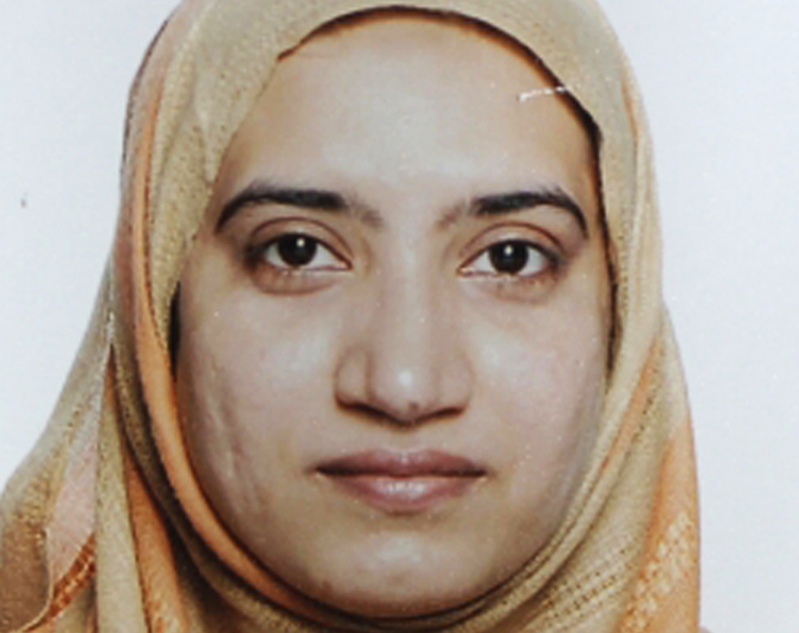
U.S. authorities in Pakistan could have sought - but did not - a full background security investigation of San Bernardino shooter Tashfeen Malik before granting her a visa to enter the United States in 2014, according to a U.S. official familiar with the matter.
Under the U.S. "Visa Security Program," consular officials in American embassies overseas can ask U.S. Immigration and Customs Enforcement (ICE) agents stationed in the embassies to produce a "Security Assessment Opinion," or SAO, before the consulate decides whether to approve a U.S. visa application.
A deeper investigation was not, however, requested for Malik because routine background checks turned up no "derogatory information" that raised the suspicions of visa reviewers, the official said.
It was the latest twist in the case of U.S.-born Syed Rizwan Farook, 28, his Pakistani-born wife, Malik, 29, who investigators said became radicalized long before they killed 14 people in a shooting rampage in San Bernardino, California, on Dec. 2.
Questions have been raised whether the U.S. government missed any warning signs of the attack, which investigators believe was inspired by Islamic State but not directed by the militant group.
VISA PROCESS SCRUTINIZED
How Malik was secured her spousal visa, known as a K-1 visa, has come under close scrutiny.
Before issuing an SAO, ICE agents "may conduct applicant interviews, additional database checks, a physical document review and liaison with local law enforcement officials," said a 2009 Department of Homeland Security (DHS) paper that described the investigation procedure.
In Malik's case, though, since earlier background checks did not raise suspicions, no SAO investigation was requested before she was granted a visa to enter the United States as Farook's fiancée, the U.S. official said.
A spokeswoman for the DHS, which oversees ICE, declined to comment.
Routine visa background inquiries usually include checking a visa applicant's name against various spy agency and law enforcement databases, but would not normally involve extensive investigations in the applicant's country of origin.
Absent a compelling reason for consular officials to ask for an SAO investigation on a visa applicant, officials said, such checks normally would not be conducted. One official noted that the U.S. government issues 70 million visas to foreigners every year and does not have resources to thoroughly investigate all of them.
It is unclear, however, whether even an SAO investigation of Malik would have turned up information that might have raised questions about whether Malik should have been awarded a U.S. visa.
Officials have said that before being granted a visa, Malik underwent national security and criminal background checks conducted by Homeland Security, the State Department and U.S. spy agencies.
She was also interviewed by the U.S. consulate in Pakistan, and the New York Times reported that she was interviewed by a U.S. immigration officer in the United States before being granted a permanent resident's green card.
U.S. officials have said that Malik and Farook were completely unknown to U.S. spy agencies before the San Bernardino shootings.
SOCIAL MEDIA
U.S. officials have also acknowledged that under visa vetting procedures at the time that Malik applied for her visa, no one routinely checked applicants' social media postings for irregularities.
Members of the U.S. Congress on Tuesday pushed for a U.S. law to require reviews of social media postings, as well as public databases. Republican Senator John McCain introduced legislation requiring such searches and 22 Senate Democrats wrote to the DHS asking for a similar change.
Officials familiar with the investigation into the San Bernardino shootings say that it was discovered after the shootings that Malik began posting social media messages demonstrating a sympathy for Islamic militancy before her U.S. visa was granted.
At the time, U.S. officials involved in vetting visa applicants were under pressure from the Obama administration to avoid looking at visa applicants' social media postings out of respect for their privacy and civil liberties, two former DHS officials said.
Other officials familiar with post-shooting investigations into Malik's background said that Malik posted her pro-jihadist messages under a pseudonym and also activated privacy settings, which meant that any alarming messages would have been difficult to find even if visa reviewers had been able to look for them.
Two U.S. officials said on Tuesday that even the message Malik posted around the time of the shooting in which she pledged allegiance to the Islamic State movement would have been hard for investigators to discover because she posted it on someone else's Facebook page.







